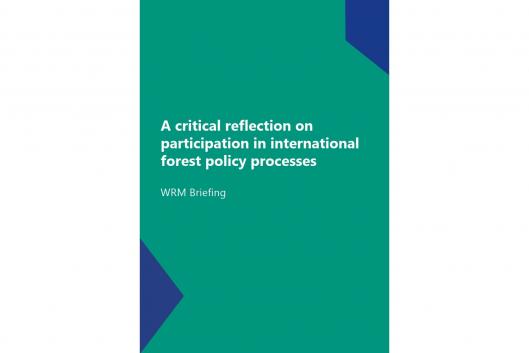Every year a large number of social movements and NGOs spend time and energy producing analyses and policy recommendations in the hopes of influencing policy makers’ decisions around issues such as deforestation, climate change and the rights of forest-dependent peoples and peasant communities. The upcoming UN Climate Conference and the Convention on Biodiversity Conference will be no different.
Yet, every year, policy makers mostly ignore these recommendations. At best, some pieces of text from civil society groups may end up in policy documents—though usually when it does not interfere with established decisions. That is why many policy recommendations still look very much the same, year after year.
This raises many questions, such as: Is participating in international policy processes a good strategy to ‘influence the outcome’ of such negotiations? Are the time and resources spent on attending these meetings (especially for community leaders and Indigenous Peoples who have to leave their territories and communities to attend) the best way to support struggles on the ground? Will introducing “true and correct” information in such processes always be beneficial for grassroots struggles? Or could this also turn into a threat for these struggles? And, is a lack of information really the problem in these policy-making spaces and negotiations?
On the eve of two new rounds of UN climate and biodiversity Conferences of the Parties (COPs), a new WRM briefing intends to reflect on these questions. The briefing is based on WRM’s experience and that of grassroots activists with whom WRM collaborates.
Both the climate and biodiversity COPs are clear examples of spaces where policy makers have systematically ignored policy recommendations from civil society groups; these groups have been consistently and resolutely urging policy makers to tackle the root causes of the climate, biodiversity and deforestation crises—which, indeed, are getting worse year after year.
Instead, these COPs have come up with policies that fuel further deforestation and pollution, by allowing industries to continue doing business as usual while claiming that they are offsetting their fossil fuel emissions. The main forest policy has been the REDD mechanism (Reducing Emissions from Deforestation and Forest Degradation), which, after 15 years, continues to be an absolute failure in reducing deforestation. More recent trends, such as ‘Nature-Based Solutions’ (NBS) and ‘net-zero’ emissions, follow the same logic.
As many civil society groups prepare to participate in this process with yet another series of analyses and policy recommendations for the UN COPs, critical reflections about such participation continue to be scarce. This WRM briefing is meant to move forward in filling that gap.
This is the second in a series of briefings based on a longer discussion paper produced from 2019-2021 by Larry Lohmann, a member of WRM’s advisory committee. The discussion paper is based on input from interviews with several grassroots activists, the WRM advisory committee and the international secretariat; and it is a critical self-reflection on WRM’s past, present and future work around forests, deforestation and its participation in international forest policy processes, fora and initiatives. The discussion paper can be accessed here.
World Rainforest Movement
October 2022
